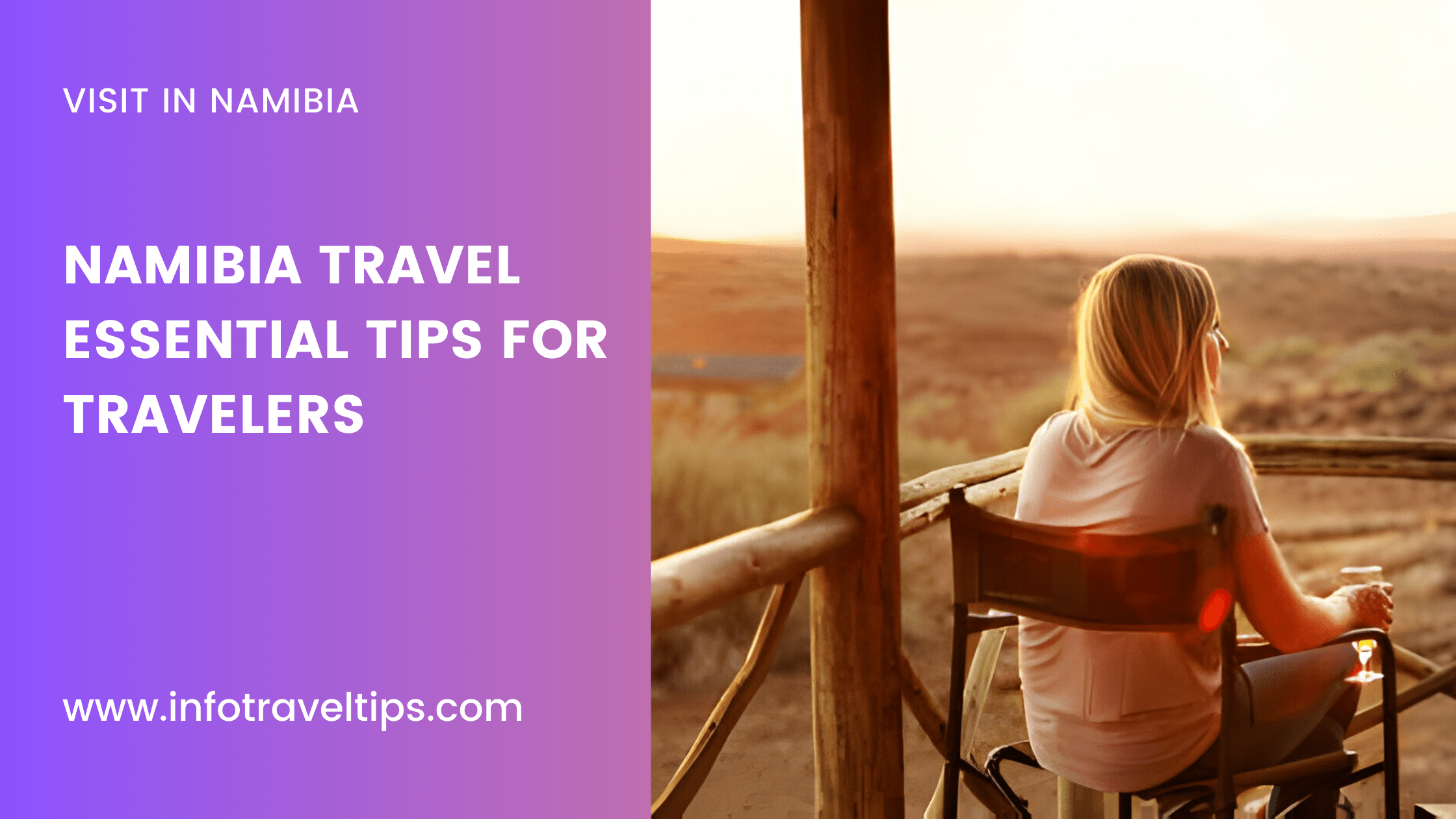Discover essential Namibia travel health tips to ensure a safe and enjoyable journey. Learn about vaccinations, health precautions, and more for your adventure in Namibia’s stunning landscapes. Namibia, known for its breathtaking landscapes from the Namib Desert to the rugged coastline, offers an adventure of a lifetime. However, its arid climate poses a significant challenge, especially when it comes to staying hydrated. Understanding the importance of hydration and knowing how to effectively maintain it is crucial for any traveler exploring this beautiful country. Here’s a guide to help you stay hydrated and healthy in the heat of Namibia.
Namibia travel health tips
Why Hydration is Key in Namibia
Namibia’s climate, predominantly desert and semi-desert, means high temperatures and low humidity, especially in the summer months. In such conditions, your body loses water at a faster rate through perspiration and staying hydrated becomes essential to avoid heat-related illnesses.
Recognizing the Signs of Dehydration
Dehydration happens when your body loses more water than you drink. Recognizing its early signs is crucial:
- Thirst
- Dry mouth
- Fatigue or dizziness
- Less frequent urination or dark yellow urine
- Dry, cool skin
In severe cases, dehydration can lead to heat exhaustion or heat stroke, both of which require immediate medical attention.
Best Fluids to Consume
- Water: The most effective way to stay hydrated. Aim for at least 2-3 liters per day, but increase this amount if you’re active or it’s particularly hot.
- Electrolyte-Replenishing Drinks: Sports drinks can be beneficial as they replace electrolytes lost through sweat.
- Coconut Water: A natural alternative to sports drinks, coconut water is high in potassium and other electrolytes.
- Herbal Teas: If you prefer hot drinks, opt for herbal teas which can be hydrating and refreshing.
- Fruit Juice: Fruit juices can be hydrating, but opt for those without added sugars.
Tips for Staying Hydrated
- Start Early: Begin your day by drinking water, and continue drinking small amounts frequently throughout the day.
- Avoid Alcohol and Caffeine: These can lead to increased urination and potential dehydration.
- Eat Water-Rich Foods: Include fruits like watermelon, oranges, and berries in your diet, as they are high in water content.
- Carry a Water Bottle: Always have a reusable water bottle with you and refill it regularly.
- Plan for the Climate: If you’re going out for a hike or a long day of sightseeing, plan your water needs accordingly.
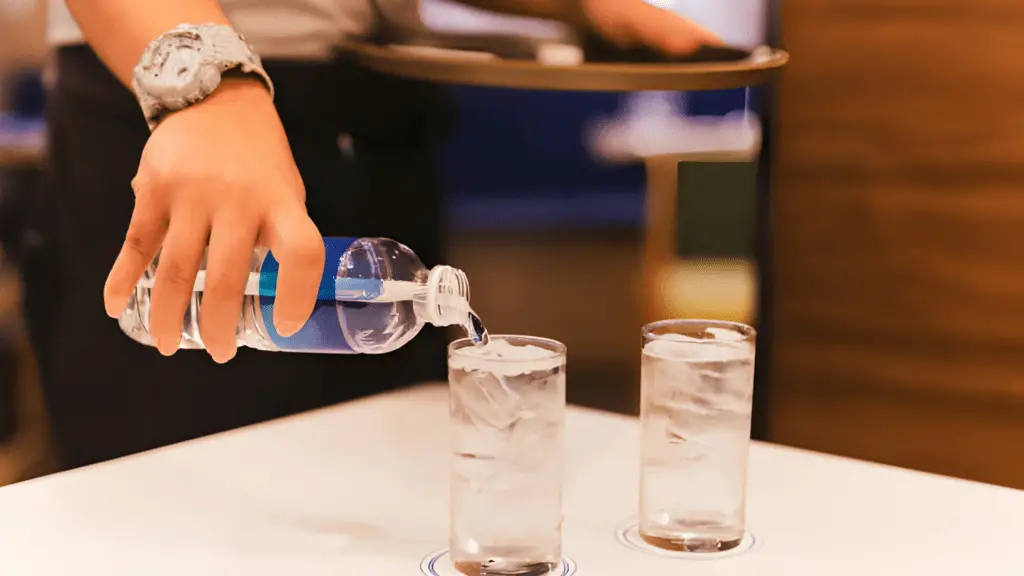
Recommended Vaccinations for Namibia
Routine Vaccinations: Make sure your routine vaccinations such as measles-mumps-rubella (MMR), diphtheria-tetanus-pertussis, varicella (chickenpox), polio, and your yearly flu shot are up to date.
Hepatitis A: This vaccine is recommended as you can get hepatitis A through contaminated food or water in Namibia, regardless of where you are eating or staying.
Hepatitis B: You can get hepatitis B through sexual contact, contaminated needles, and blood products, so vaccination is recommended if you have sex with a new partner, get a tattoo or piercing, or have any medical procedures.
Typhoid: Especially recommended for travelers visiting smaller cities, villages, or rural areas, or if you are an adventurous eater. You can get typhoid from eating or drinking something that has germs in it
Rabies: Considered for travelers involved in outdoor and other activities in remote areas that put them at risk for animal bites.
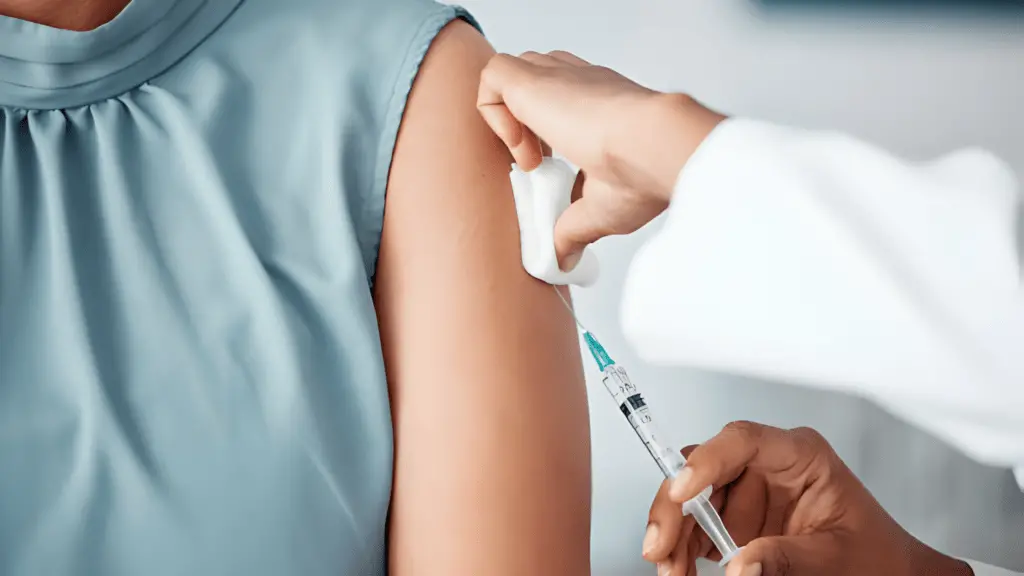
Preventive Medications for Malaria
Malaria is a risk in certain areas of Namibia, particularly in the northern regions. The following preventive measures are advised:
- Antimalarial Medication: Consult with your healthcare provider to get a prescription for antimalarial drugs, suitable for the region you are visiting.
- Mosquito Avoidance Strategies: Use mosquito repellents, wear long-sleeved clothing, and sleep under insecticide-treated mosquito nets.
Yellow Fever Vaccination
Although yellow fever is not a risk in Namibia, the government of Namibia requires proof of yellow fever vaccination only if you are arriving from a country with a risk of yellow fever. This does not include the US. Check with your destination’s health department to see if this requirement applies to you.
Timing of Vaccinations
It’s important to consult with a healthcare provider ideally 4-6 weeks before your trip, as some vaccinations require a series of doses and take time to become fully effective.
Travel Health Kit
In addition to vaccinations, consider packing a travel health kit with prescription medications, over-the-counter medicines, and first aid supplies.
Safe Eating and Drinking Practices in Namibia
Food and waterborne illnesses are caused by consuming contaminated food or water. Usual signs are an upset stomach, throwing up, and belly pain In Namibia, where climate conditions can accelerate food spoilage, it’s important to be cautious.
Safe Food Practices
- Eat Well-Cooked Foods: Ensure that food, especially meat and fish, is thoroughly cooked. Avoid raw or undercooked dishes, including salads that may not have been washed with safe water.
- Choose Reputable Eateries: Opt for restaurants and food vendors that appear clean and well-maintained, and where food is prepared to order.
- Avoid Street Food if Uncertain: While street food is a significant part of local culture, exercise caution. If you’re unsure about the hygiene standards, it’s better to avoid it.
- Wash Hands Regularly: Always wash your hands with soap and water before eating, or use a hand sanitizer if water isn’t available.
- Fruit and Vegetables: Eat fruits that you can peel yourself, like bananas and oranges, and avoid fruits that can’t be peeled or that have been pre-cut.
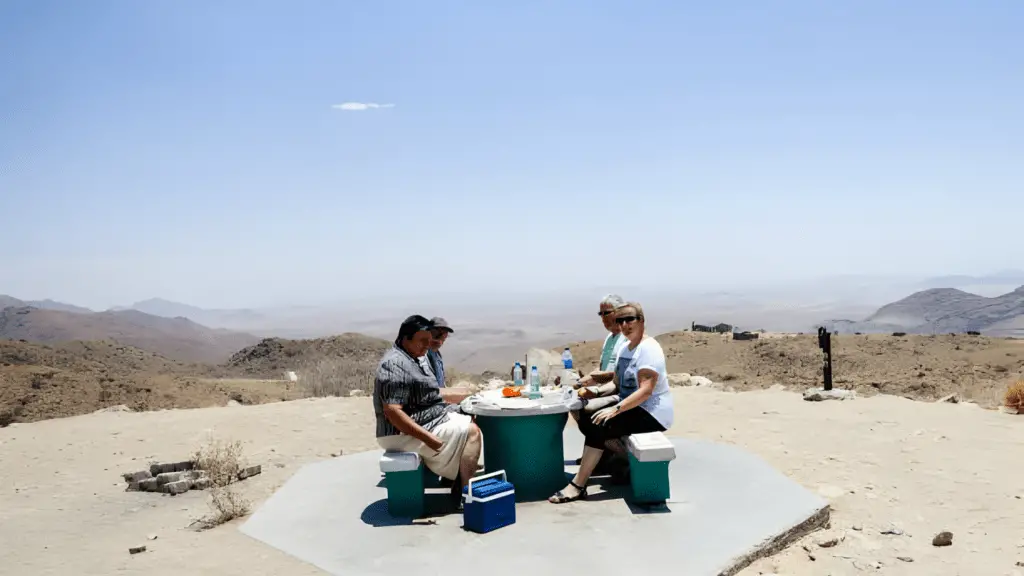
Safe Drinking Practices
- Use bottled water for drinking and cleaning your teeth. Make sure the bottle is properly sealed when you buy it.
- Boiling Water: If bottled water isn’t available, boil water for at least one minute before drinking or using it to clean your teeth.
- Water Purification: Consider using water purification tablets or a portable water filter, especially if you’re traveling to remote areas.
- Avoid Ice: Unless you’re certain it’s made from purified water, avoid ice in drinks, as it may be made from tap water.
- Beverages: Hot beverages like tea and coffee are usually safe, as the boiling process kills harmful bacteria.
What to Do if You Get Sick
Here’s a table chart of some notable hospitals and clinics in Namibia with their address
| Hospital/Clinic Name | Address |
|---|---|
| Lady Pohamba Private Hospital | c/o Frankie Fredericks and Ombike Drive, Kleine Kuppe, Windhoek |
| Mediclinic – Windhoek | Heliodoor Street, Windhoek |
| Rhino Park Private Hospital | Rhino Park, Hosea Kutako Drive, Windhoek |
| Roman Catholic Hospital | 92 Stübel Street, Windhoek |
| Windhoek Central Hospital | Ooievaar Street, Windhoek |
| Ongwediva Medipark | Ongwediva Business Park, Auguste Tanyaanda Street, Ongwediva |
| Mediclinic | c/o Fransiska and Haupt Avenue, Tamariskia, Swakopmund |
| Welwitchia Hospital | Rikumbi Kandanga Road, Walvis Bay |
| Medicare Centre | Maerua Pk, Centaurus Rd, Ausspannplatz, Windhoek |
| Methealth Namibia Administrators | Methealth Office Park Maerua Mall, Windhoek |
Avoiding Insect Bites and Managing Allergies
Namibia’s stunning landscapes and rich biodiversity make it a haven for outdoor enthusiasts. However, this natural beauty comes with the presence of various insects, including mosquitoes, which can be more than just a nuisance. Insect bites can lead to allergic reactions and transmit diseases. Here’s how to effectively prevent insect bites and manage allergies, ensuring a safe and enjoyable experience in Namibia’s great outdoors.
Preventing Insect Bites
1. Use Insect Repellent: Apply a DEET-based insect repellent to exposed skin. Repellents containing Picaridin or oil of lemon eucalyptus are also effective. Reapply as directed, especially after swimming or sweating.
2. Wear Appropriate Clothing: Wear long-sleeved shirts and long pants, preferably in light colors, as dark colors attract mosquitoes. Put the ends of your pants inside your socks for more safety
3. Use Permethrin: Treat clothing and gear, such as boots, pants, and tents, with permethrin, an insect repellent that can be applied to fabric.
4. Avoid Peak Insect Times: Dawn and dusk are typically when mosquitoes are most active. Try to limit outdoor activity during these times.
5. Stay in Well-Screened Areas: When possible, choose accommodations with good screening on doors and windows or use a bed net if sleeping in areas exposed to the outdoors.
6. Avoid Scented Products: Fragrances in soaps, shampoos, and lotions can attract insects. Opt for unscented products when possible.
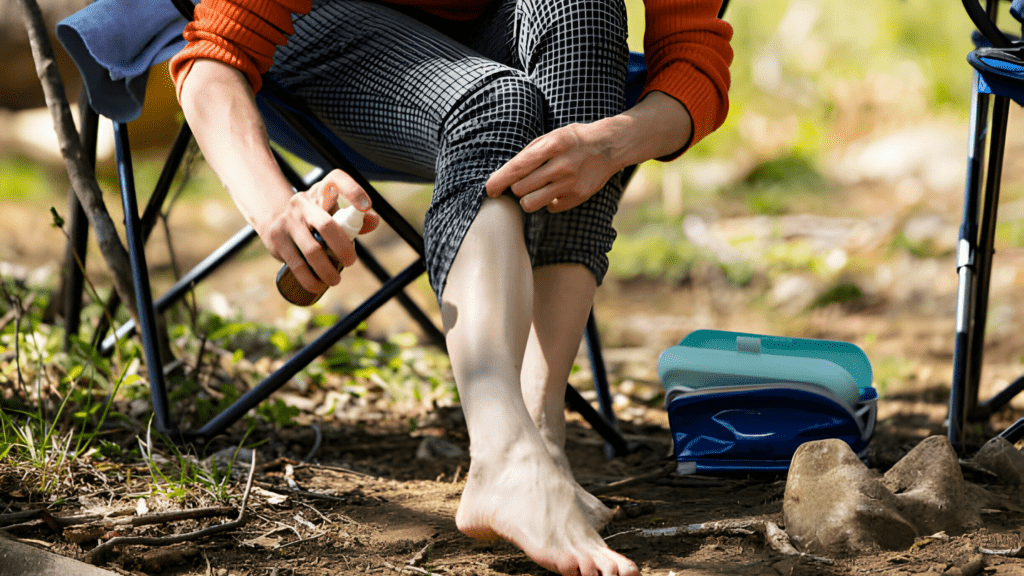
Managing Allergies
1. Know Your Allergens: Be aware of your specific allergens and how to avoid them. If you have severe allergies, consider wearing an allergy identification bracelet.
2. Carry Medication: Always carry antihistamines, corticosteroids, or any prescribed allergy medication, especially if you have known insect allergies.
3. Immediate Response to Bites: If bitten, clean the area with soap and water. Apply a cold compress to reduce swelling and itching. Avoid scratching to prevent infection.
4. Recognize Anaphylaxis Symptoms: Symptoms like difficulty breathing, swelling of the face or throat, and rapid pulse require immediate medical attention. If you have a history of severe allergic reactions, carry an epinephrine auto-injector (EpiPen) and know how to use it.
5. Seek Medical Help for Severe Reactions: If you experience a severe allergic reaction, seek medical attention immediately.
6. Be Prepared for Remote Areas: When traveling in remote areas, have a plan for how to access medical care if needed.
Here’s a chart table summarizing key safety guidelines for tourists traveling to Namibia:
| Safety Concern | Guidelines and Tips |
|---|---|
| Crime | – Avoid walking alone after dark.<br> – Do not display valuables.<br> – Be cautious of roadside assistance. |
| Road Safety | – Be careful on secondary roads, especially in rainy season.<br> – Avoid night driving in rural areas. |
| Civil Unrest and Political Violence | – Generally low risk. Stay informed during election times. |
| Environmental Hazards | – Be cautious of extreme temperatures and flooding.<br> – Avoid crossing flowing water in vehicles. |
| Kidnapping Risk | – Very low risk for tourists. |
| Drug Laws | – Strictly enforced. Avoid using or carrying illegal drugs. |
| Photography in Secure Areas | – Do not take pictures of government buildings or secure areas without permission. |
| Adventure Tourism and Outdoor Activities | – Ensure travel insurance covers activities.<br> – Be aware of risks in outdoor activities. |
| Vehicle and Credit Card Security | – Be vigilant at intersections and when using credit cards to avoid theft and skimming. |
| Carrying Identification | – Be careful on secondary roads, especially in the rainy season.<br> – Avoid night driving in rural areas. |
Conclusion
Staying hydrated in Namibia’s heat is not just about quenching your thirst; it’s about maintaining your health so you can fully enjoy the splendors of this unique country. By following these tips and being mindful of your body’s needs, you can ensure that your Namibian adventure is both exhilarating and safe. Remember, when in doubt, take a sip of water – your body will thank you for it!

